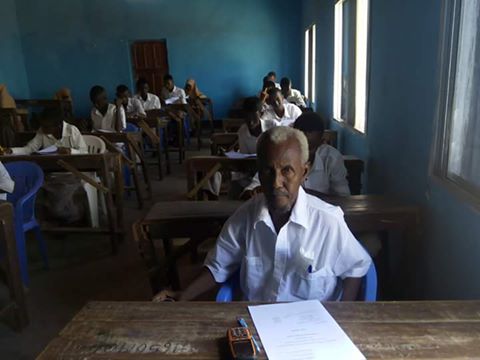Ahmed Mohamed Ali dropped out of school to support his family by working when he was 10 years old. Over the years, he became a well-known tailor in his hometown of Bal’ad, Somalia, but he never gave up on his dream of getting an education.
Over the years, he made attempts to go back to school but the economic situation in Somalia forced him to continue working as a tailor.
Four years ago, Ahmed finally got his chance, and this week at the age of 61, the father of four was one of several thousand students who sat for their high school exams.
“People were surprised. They told me to give up because of my age, but I said you are never too old to learn,” he told VOA Somali.
Education ‘is a light’
Ahmed said he always knew he had to get back to learning at some point.
“Education improves people, it’s a light, and I thought it will be my guide in life for me and my family.”
Ahmed Saney, as he is popularly known, says he now wants to go to university and become a medical doctor. In 61 years, he has never yet left Bal’ad, except on a few occasions when he visited the capital, Mogadishu, just 30 kilometers south.
His success has made him a social media sensation. After his sudden rise, the town’s administration offered him support. He says he received pledges for help with the cost of a university education.
Ahmed is from a traditional paternal society where boys get more access to education than girls. His older son, Mohamed, graduated from high school but, because of a lack of job opportunities and better education, he migrated to South Africa where he was killed four years ago following an attack on Somali shops in Johannesburg. Ahmed believes the incident was related to xenophobic attacks against Somalis and other immigrants.
Three of his four living children, the daughters, have not been to school and have since married, leaving him to go to school with his youngest child, a son, who is in grade 6.
Inspiration to classmates
Ahmed has been receiving compliments all week from the community. Even his classmates, who doubted and made fun of him him early on because of his age, now find him inspiring.
“Some of my classmates said to me they will try to bring their fathers back into schools,” Ahmed said.
Despite the uncertainty over security and dim job opportunities, as many as 45,000 students have been taking their middle and high school exams.
In Mogadishu and the south central regions of the country, government officials say nearly 20,000 students are taking their exams. Officials have praised law enforcement for tightening security at examination centers in south central Somalia following alleged Al-Shabab threats against the students.
Al-Shabab regards the national curriculum as “un-Islamic” and a form of western influence.
“We applaud the orderly, spirited and the hard work shown by everybody and the students,” said Mogadishu Mayor Yusuf Hussein Jimale.
In Puntland, authorities say more than 11,000 students reported to take their exams.
Somaliland, which seceded from the rest of Somalia and is more stable, recorded 25,000 students taking exams.
Many of the young generation, who are almost 70 percent unemployed, opt to leave the country and often take dangerous sea travels that cost many their lives. Last month, more than 200 young men from Somaliland died in the Mediterranean Sea after their boat capsized.
Last week, Somali authorities in the central regions and Puntland arrested 150 young men — most of them between the ages of 15 and 20 — who were suspected of attempting to leave the country as part of the human smuggling network.









